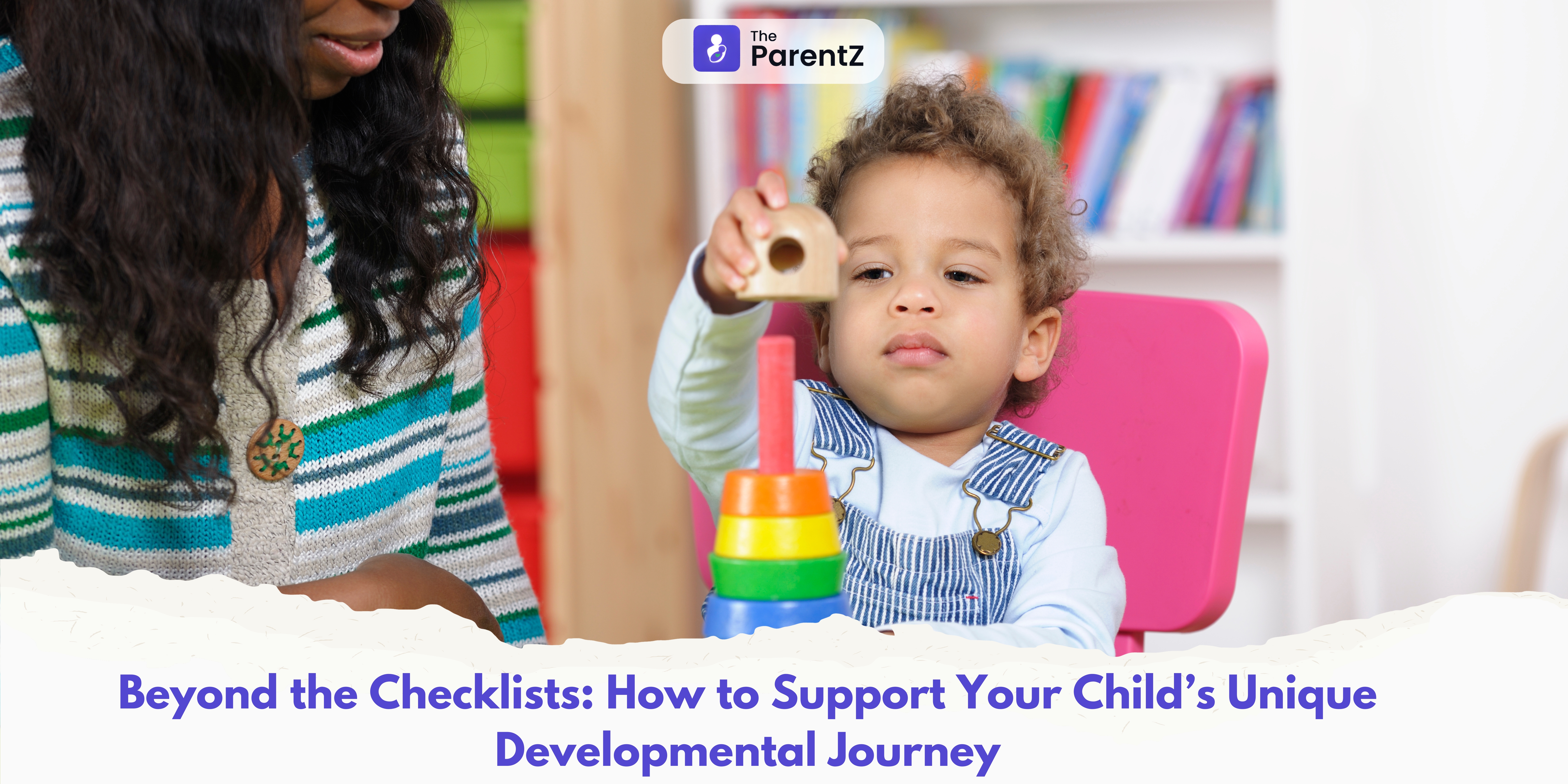Each child develops in their own way, shaped by a combination of genetics, environment, and experiences. According to developmental psychology research, children do not follow a one-size-fits-all trajectory. Variations in physical growth, cognitive development, and emotional maturity are normal. What might be a significant delay for one child may be perfectly typical for another.
Why Developmental Checklists Are Only Guidelines
Developmental checklists, like those from the Centers for Disease Control and Prevention (CDC) or World Health Organization (WHO), offer a general idea of when most children reach certain milestones. However, it’s crucial to remember that these checklists are based on averages. They do not account for the full spectrum of what is considered healthy development. For example:
- Some children might start walking at 10 months, while others might not take their first steps until 18 months—both are within the normal range.
- Similarly, speech development varies greatly. Some toddlers may be chatty at age two, while others are more focused on developing their physical skills.
The Role of Temperament and Learning Styles
Each child has a unique temperament that influences how they approach the world, which in turn affects their developmental pace. For instance, some children may be more cautious and reserved, taking longer to explore new skills like climbing or speaking in groups, while others may jump into these activities with enthusiasm.
Learning styles also play a role. Visual learners might develop spatial awareness and problem-solving skills before language, while auditory learners may excel in verbal communication early on. Recognizing these differences allows parents to support their child’s natural strengths rather than focusing solely on “catching up” in other areas.
Nurturing Cognitive and Emotional Growth: The Power of Play
Research shows that play is one of the most important tools in a child’s developmental toolkit. Through play, children learn how to interact with the world around them, solve problems, build social skills, and regulate their emotions. It’s a critical part of supporting cognitive, emotional, and social growth, far beyond simply achieving developmental milestones.
The Benefits of Free Play
Free play—where children lead the activity without structured goals—has been shown to stimulate creativity, decision-making, and resilience. According to a study published in Pediatrics, free play promotes executive function—a set of cognitive processes that help children manage themselves and their resources. Executive function includes skills like memory, self-control, and flexible thinking, all of which are crucial for future learning and social interactions.
Free play also allows children to work through emotions, try out new ideas, and take safe risks, which are essential for emotional development. By observing your child during free play, you can learn about their preferences, problem-solving methods, and social interests.
Emotional Intelligence Through Social Play
While solitary play is important, social interactions with peers are essential for developing emotional intelligence—the ability to recognize, understand, and manage emotions. Playdates, cooperative games, and even sibling rivalry teach children about empathy, sharing, and conflict resolution. Encouraging group activities, especially those that require collaboration, can enhance a child’s ability to read social cues and regulate their emotions in social settings.
Listening to Your Child’s Signals: How to Respond to Their Individual Needs
Every child communicates their needs and frustrations differently, whether verbally or through body language and behavior. Recognizing these signals is a crucial aspect of supporting a child’s development. Instead of solely focusing on external markers, such as achieving milestones on time, listening to what your child is trying to express about their internal world can provide valuable insight into their growth process.
Identifying Developmental Strengths
One of the best ways to support your child’s developmental journey is by paying attention to their interests and strengths. If your child shows an early fascination with building blocks, puzzles, or drawing, these activities may indicate their emerging strengths in spatial reasoning, fine motor skills, or creativity. Similarly, a child who enjoys pretend play might be developing advanced social or emotional understanding.
Encouraging these strengths doesn’t mean pushing your child toward specific goals, but rather offering more opportunities for them to explore their interests at their own pace. For example, if your child enjoys solving puzzles, provide more challenging games to help them further develop their problem-solving abilities.
Responding to Developmental Frustrations
Sometimes, children will express frustration with certain developmental tasks. This frustration can manifest in behaviors like tantrums, avoidance, or reluctance to engage in certain activities. Instead of pressuring a child to push through these difficulties, it’s often better to acknowledge their frustration and offer gentle guidance or break the task into smaller steps.
For example, a child who is struggling to learn how to tie their shoes may need extra encouragement and repeated practice over time. Parents can support this process by being patient and offering assistance when needed, rather than expecting immediate mastery.
Fostering a Supportive Environment: Encouragement Without Pressure
Children thrive in environments that provide encouragement without excessive pressure. It’s natural for parents to want their children to succeed, but an overemphasis on reaching developmental milestones quickly can lead to unnecessary stress for both the parent and the child. A nurturing environment balances guidance with autonomy, allowing children to explore and grow at their own pace.
Encouraging a Growth Mindset
Psychologist Carol Dweck’s concept of the growth mindset emphasizes the importance of viewing challenges as opportunities for growth rather than setbacks. Encouraging your child to adopt a growth mindset involves praising their effort rather than focusing solely on the outcome. For instance, instead of saying “You’re so smart,” try, “You worked really hard on that puzzle!” This approach helps children understand that effort and persistence are key to mastering new skills, which fosters resilience and perseverance.
Avoiding Comparisons to Peers
One common pitfall in developmental tracking is comparing your child’s progress to that of their peers. Such comparisons can inadvertently place undue pressure on the child and lead to feelings of inadequacy. Instead, focus on your child’s individual growth, celebrating their unique achievements and progress, no matter how small.
Traditional vs. Modern Approaches to Child Development
In the past, child development was often seen as a more rigid process, with prescribed steps and expectations for each stage of growth. Today, however, developmental science acknowledges that there is no single path to success, and modern approaches are more flexible and child-centered than ever before.
Traditional Child Development: Structured Milestones
Traditionally, child development was tracked closely against structured milestones. Parents were often encouraged to ensure their child met certain expectations by specific ages. This included practices such as:
- Early focus on academic skills, such as reading and writing.
- Strict adherence to timelines for walking, talking, and social behavior.
While traditional approaches provided some useful guidelines, they also created an environment where delays or deviations from the norm were often viewed negatively, leading to unnecessary concern for parents and children.
Modern Child Development: Focus on Individual Growth
Modern approaches to child development focus on the individual child’s needs and interests, allowing for a broader range of what’s considered “normal.” Rather than pushing children to meet specific deadlines, modern parenting and education philosophies emphasize child-led learning and personalized growth.
For instance, Montessori and Reggio Emilia methods advocate for children’s independence in learning, encouraging hands-on experiences and self-directed exploration. These approaches prioritize curiosity and problem-solving over rigid milestones, giving children the freedom to develop at their own pace.
Conclusion: Supporting Your Child’s Unique Developmental Journey
While developmental milestones can offer helpful guidance, every child’s journey is unique. Moving beyond checklists to focus on your child’s individual interests, strengths, and emotional needs allows you to support their growth in a holistic way. By creating an environment that encourages curiosity, play, and emotional resilience, you foster a love of learning and a confidence in their abilities, helping them navigate the world in their own unique way.
Embrace your child’s developmental path as a journey rather than a race, and celebrate the milestones that come naturally along the way. Whether through play, social interaction, or quiet observation, your support is the foundation that helps them thrive at every stage of their life









Be the first one to comment on this story.